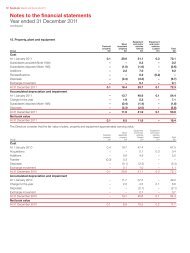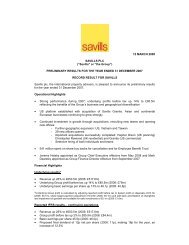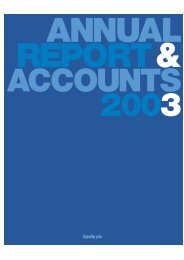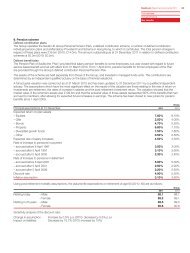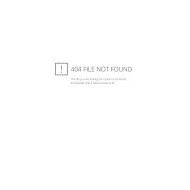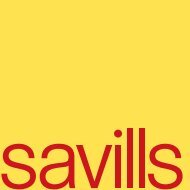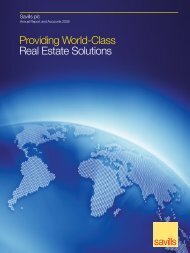Savills plc 2012 Annual Report - (PDF) - Investor relations
Savills plc 2012 Annual Report - (PDF) - Investor relations
Savills plc 2012 Annual Report - (PDF) - Investor relations
Create successful ePaper yourself
Turn your PDF publications into a flip-book with our unique Google optimized e-Paper software.
Notes to the financial statementsYear ended 31 December <strong>2012</strong>continuedStandards, amendments and interpretations to standards that arenot yet effective and have not been early adopted by the GroupThe following standards and amendments to published standardsare mandatory for accounting periods beginning on or after1 January 2013, and have not been early adopted:– IAS 1 (amendment), ‘Financial statement presentation’,regarding other comprehensive income. These amendmentsrequire entities to group items presented in othercomprehensive income on the basis of whether they arepotentially reclassifiable to profit or loss subsequently andis effective for accounting periods beginning on or after1 July <strong>2012</strong>.– IAS 19 (amendment), ‘Employee benefits’, effective foraccounting periods beginning on or after 1 January 2013.These amendments changes a number of disclosurerequirements for post employment arrangements andrestricts the options currently available on how to account fordefined benefit pension plans. The most significant changethat will impact the Group is that the amendment requires theexpected returns on pension plan assets, currently calculatedbased on management’s estimate of expected returns, to bereplaced by a credit on the pension plan assets calculated atthe liability discount rate. The Group estimates the adoption ofthe revised IAS 19 would result in an additional charge to theincome statement in the year ended 31 December <strong>2012</strong> ofapproximately £2.4 million. The change does not impact theGroup’s net assets.– IFRS 7 (amendment), ‘Financial instruments: Disclosures’,regarding asset and liability offsetting, effective for accountingperiods beginning on or after 1 January 2013. Theamendment includes new disclosures to facilitate comparisonbetween those entities that prepare IFRS financial statementsto those that prepare financial statements in accordance withUS GAAP.– IFRS 10, ‘Consolidated financial statements’, effective foraccounting periods beginning on or after 1 January 2014.The standard establishes principles for the presentation andpreparation of consolidated financial statements when anentity controls one or more other entities. It defines theprinciple of control and establishes this as the basis forconsolidation. The standard is not expected to have a materialimpact on the Group.– IFRS 11, ‘Joint arrangements’, effective for accounting periodsbeginning on or after 1 January 2014. The standard definestwo types of joint arrangements: joint operations and jointventures, based on the rights and obligations of the parties tothe arrangement. Proportional consolidation of joint ventureswill no longer be allowed and must be accounted for using theequity method. The standard is not expected to have amaterial impact on the Group.– IFRS 12, ‘Disclosures of interests in other entities’, effective foraccounting periods beginning on or after 1 January 2014. Thestandard sets out the disclosure requirements for all forms ofinterests in other entities, including joint arrangements,associates, special purpose vehicles and other off balancesheet vehicles.– IFRS 13, ‘Fair value measurement’, effective for accountingperiods beginning on or after 1 January 2013. The standardaims to improve consistency and reduce complexity byproviding a precise definition of fair value and a single sourceof fair value measurement and disclosure requirements foruse across IFRSs. The requirements do not extend the use offair value accounting but provide guidance on how it shouldbe applied.– IAS 32 (amendment), ‘Financial instruments: Presentation’,regarding asset and liability offsetting, effective for accountingperiods beginning on or after 1 January 2014. Theseamendments are to the application guidance in IAS 32 andclarify some of the requirements for offsetting financial assetsand financial liabilities on the balance sheet. The amendmentsare not expected to have a material impact on the Group.– IFRS 9, ‘Financial instruments’. This standard is the first stepin the process to replace IAS 39, ‘Financial instruments:recognition and measurement’. The effective date has beendelayed to annual periods beginning on or after 1 January2015. Early adoption is permitted, however, the standard hasnot yet been endorsed by the EU. The Group has yet toassess IFRS 9’s full impact.– IAS 1 (amendment), ‘Financial statement presentation’,distinguishes between minimum required comparativeinformation and voluntary additional comparative information.The amendment is effective for accounting periods beginningon or after 1 January 2013.– IAS 32 (amendment), ‘Financial instruments: Presentation’,clarifies that income taxes arising from distributions to equityholders are accounted for in accordance with IAS 12, ‘IncomeTaxes’. The amendment is effective for accounting periodsbeginning on or after 1 January 2013 and is not expected tohave a material impact on the Group.– IAS 34 (amendment), ‘Interim Financial <strong>Report</strong>ing’, aligns thedisclosure requirement for total segment assets and liabilitiesin interim financial statements with annual disclosures. Theamendment is effective for accounting periods beginning onor after 1 January 2013 and is not expected to have an impacton the Group.– IAS 28 (amendment), ‘Investments in associates and jointventures’, includes requirements for joint ventures, as wellas associates, to be equity accounted following the issue ofIFRS 11. The amendment is effective for accounting periodsbeginning on or after 1 January 2014 and is not expected tohave a material impact on the Group.– IAS 27 (amendment), ‘Separate financial statements’, includesthe provisions on separate financial statements that are leftafter the control provisions of IAS 27 have been included inthe new IFRS 10. The amendment is effective for accountingperiods beginning on or after 1 January 2014 and is notexpected to have a material impact on the Group.Other standards, amendments and interpretations not yet effectiveand not discussed above are not relevant to the Group.72 <strong>Savills</strong> <strong>plc</strong> <strong>Report</strong> and Accounts <strong>2012</strong>





